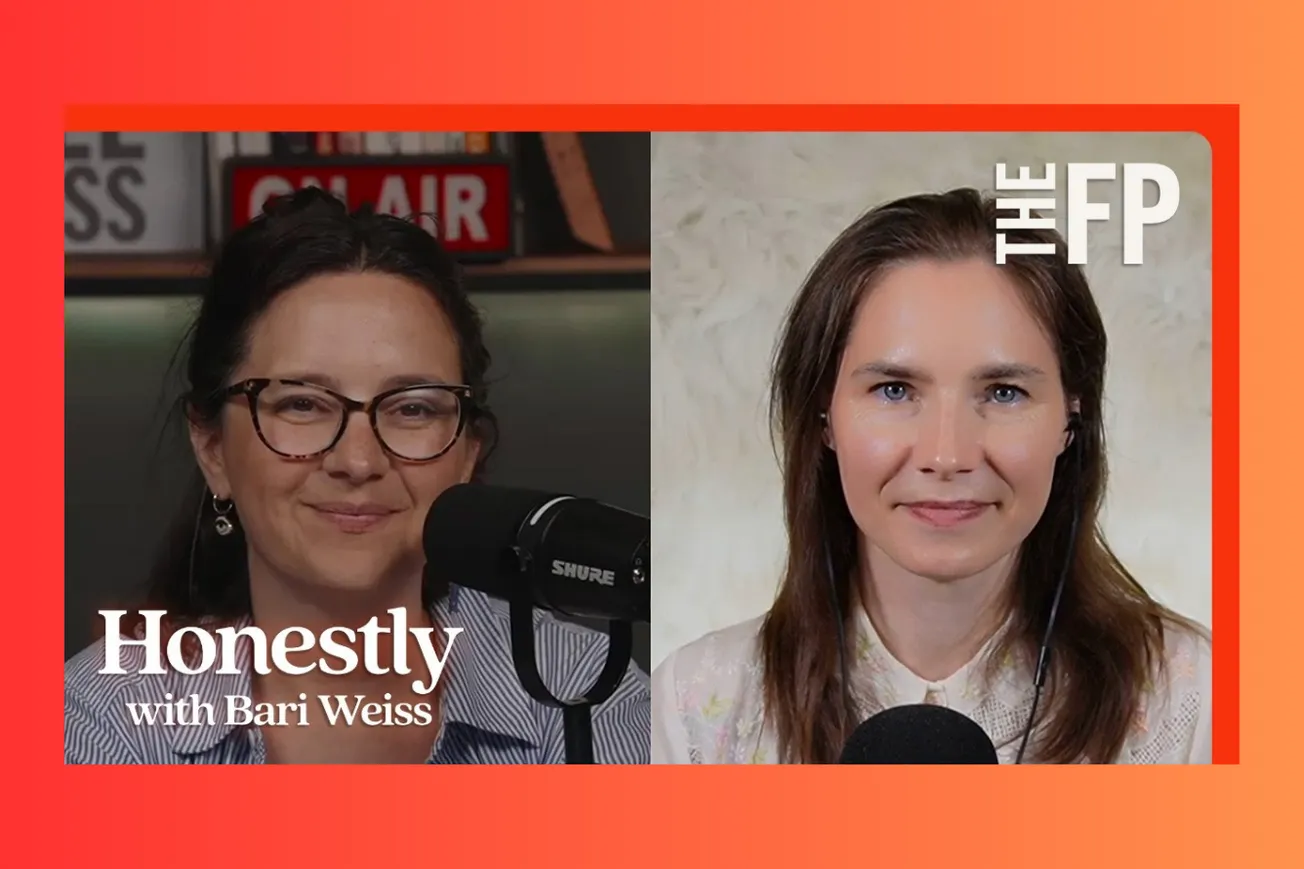Table of Contents
In 2019, Amanda Knox returned to Italy to meet face-to-face with the prosecutor who destroyed her life.
Key Takeaways
- Amanda Knox spent four years in Italian prison for a murder she didn't commit, convicted based on a prosecutor's flawed theory about a staged break-in
- She was interrogated for 53 hours without a lawyer or translator, struck by police, and pressured into signing a false confession
- Knox found purpose in prison by becoming an unofficial translator and scribe for fellow inmates who couldn't read or write Italian
- The media portrayed her as a sexual deviant, creating a pornographic fantasy that overshadowed the actual facts of the case
- After her exoneration, Knox chose to correspond with prosecutor Giuliano Menini and eventually met him in person to offer forgiveness
- The actual killer, Rudy Guede, served only 13 years and is currently on trial for sexually assaulting another young woman
- Knox describes her transformation from naive college student to someone who found meaning through radical acceptance and forgiveness
- She now views her experience as fertilizer for personal growth, feeling "informed" rather than "limited" by her wrongful conviction
- Knox maintains that proving innocence becomes a lifelong burden for the wrongfully accused, but she no longer feels trapped by this reality
The Interrogation That Changed Everything
Knox's nightmare began not with the murder itself, but with her treatment by Italian authorities in the days following Meredith Kercher's death. Coming home to find their house broken into, Knox called police and discovered her roommate's body. What should have been treated as witness testimony became something far more sinister.
- Italian prosecutor Giuliano Menini rejected the obvious explanation - that burglar Rudy Guede had broken in, sexually assaulted, and murdered Kercher - in favor of an elaborate conspiracy theory involving Knox, her week-old boyfriend Raphael, and Guede in a violent sex game gone wrong.
- Knox endured 53 hours of interrogation over five days without a lawyer or proper translator, during which police struck her and systematically broke down her confidence in her own memories.
- The interrogation techniques included gaslighting Knox about her recollections, telling her she was covering up repressed trauma, and threatening that she would never see her family again unless she confessed.
- Police capitalized on Knox's admission to smoking marijuana (which she initially denied to protect her roommates' careers) to paint her as a liar hiding darker secrets.
- The prosecutor's entire case hinged on his belief that no burglar would choose the particular window that was broken, therefore the break-in must have been staged - a deduction that led to Knox's arrest despite lack of evidence.
- Knox describes the psychological manipulation as a "slow burn" process where she gradually lost faith in her own sanity and memories, making her vulnerable to the false confession that followed.
Prison as an Unexpected Teacher
Rather than breaking Knox, her four years in Italian prison became a crucible for discovering inner strength and finding meaning within severe limitations. Her transformation from scared college student to resilient survivor happened through embracing what she could control.
- Knox learned fluent Italian during her imprisonment and discovered many fellow inmates were either foreigners who couldn't speak the language or Italians who couldn't read or write, creating an opportunity for her to serve others.
- She became the prison's unofficial translator and scribe, moving between cells to help women write letters, read legal documents, and communicate with medical staff - work that gave her life meaning within the confines.
- The prison population was divided along ethnic lines between Italians, Nigerians, and Romani women, with Knox earning the nickname "America" and initially communicating through singing Beatles songs from her isolation cell.
- Knox's relationship with Catholic chaplain Don Salo became central to her survival, not through religious conversion but through philosophical discussions about finding purpose amid unfairness and developing what she could control versus accepting what she couldn't.
- Prison taught Knox that struggle doesn't automatically lead to character development - she witnessed many inmates broken by their circumstances - but that resilience comes from conscious choice to find value within limitations.
- The experience forced Knox to abandon waiting for adults to "fix" her situation and instead take responsibility for making her confined life meaningful, a shift she describes as growing up "40 years in four."
Media's Pornographic Fantasy
The global media coverage of Knox's case reveals how society's appetite for salacious content can completely overshadow truth and justice. Knox became not a person but a projection of cultural fantasies about female sexuality and violence.
- Knox was transformed into "Foxy Knoxy," a sexually deviant caricature that bore no resemblance to the naive 20-year-old college student she actually was, with every detail of her past scrutinized for evidence of depravity.
- The prosecution's narrative deliberately reframed a man's crime (Rudy Guede's rape and murder of Meredith Kercher) as a woman-on-woman sexual crime, pitting two archetypal female figures - the innocent virgin versus the manipulative seductress - against each other.
- Media coverage focused obsessively on a moment where Knox and her boyfriend appeared to be laughing outside the crime scene, using this brief interaction as "proof" of her callousness and guilt despite its complete lack of context.
- The case became clickbait before the term existed, with Knox's appearance as a pretty young woman accused of violent sexual crime creating a "ravenous appetite" for the story that obliterated interest in actual facts.
- Knox notes that this media treatment occurred before the #MeToo movement, when reducing women to sexual stereotypes and punishing them for their sexuality was more openly acceptable in mainstream culture.
- The actual killer, Rudy Guede, received minimal media attention despite being the only person whose DNA was found at the crime scene, allowing him to assault another young woman after his release because his victim didn't know who he was.
The Long Road to Freedom
Knox's exoneration in 2015 marked the legal end of her case but not the end of her imprisonment. Freedom brought new challenges as she grappled with reintegrating into a world where she remained defined by the worst thing that had ever happened to her.
- Knox discovered that physical freedom didn't equal psychological freedom - she remained trapped by public perception as "the girl accused of murder" and struggled with ongoing media scrutiny including paparazzi at her wedding.
- The transition required rebuilding her identity from scratch, as her entire adult life had been consumed by defending against accusations, leaving her without normal developmental experiences of her twenties.
- Knox faced the unique challenge of being simultaneously exonerated and forever suspected, with many people continuing to believe in her guilt despite the legal vindication, creating ongoing social and professional obstacles.
- She describes making "a lot of mistakes" during reintegration as she struggled to understand who she could trust and what aspects of normal life she could safely engage with after years of hypervigilance.
- Knox had to reconcile with the reality that her lost years could never be restored and that proving innocence becomes a lifelong burden for the wrongfully accused, requiring her to continuously justify her existence.
- The experience taught Knox to distinguish between being "informed" versus "limited" by trauma, ultimately choosing to view her ordeal as a foundation for wisdom rather than a life sentence of victimhood.
An Extraordinary Act of Forgiveness
Knox's decision to meet with prosecutor Giuliano Menini represents one of the most remarkable examples of choosing grace over vengeance. Her journey from victim to someone capable of offering forgiveness reveals the transformative power of taking control over one's own narrative.
- Knox initiated correspondence with Menini in 2019, seeking not vindication but understanding, approaching him as a fellow human being rather than the "nightmarish figure" he represented in her mind.
- She spent three years exchanging letters with Menini before their face-to-face meeting in 2022, mediated by her former prison chaplain Don Salo, despite friends and family questioning her sanity.
- Knox realized that seeking Menini's admission of wrongdoing was focusing on "a door she couldn't open" and instead chose to focus on what she could give him - the gift of being truly seen as a human being.
- During their meeting, Knox told Menini directly that while he was wrong about her and caused immense harm, she didn't consider him an evil person and was grateful for how the experience had revealed her own strength.
- Knox describes feeling "like a superhero" during the encounter, experiencing a complete reversal of power dynamics where Menini became "like a baby bird" in her hands as she offered grace instead of condemnation.
- Menini privately acknowledges more than he's willing to say publicly about Knox's innocence, but he continues processing what he calls a "spiritual communion" and still texts Knox regularly about his evolving understanding of the case and his legacy.
Finding Meaning in the Abyss
Knox's story ultimately becomes one of radical acceptance and the choice to find meaning even in undeserved suffering. Her transformation from naive college student to someone who could offer forgiveness to her persecutor reveals profound insights about human resilience and the nature of freedom.
- Knox describes discovering that once you've "seen into the abyss" of life's fundamental unfairness and cruelty, you're forever changed, always aware of walking on a tightrope above that darkness.
- She now experiences joy alongside grief, acutely aware of life's fragility and impermanence in ways that both deepen her appreciation for good moments and create anxiety about their potential loss.
- Knox credits her mother's unconditional love as the foundation that allowed her to maintain belief in her own worth, giving her the strength to resist being broken by institutions and individuals who tried to convince her she didn't matter.
- Her meditation practice helps her sit with the paradox of embracing happiness while knowing everything beloved will eventually be lost, finding peace through accepting impermanence rather than fighting it.
- Knox views her experience as "dark fertilizer" that has given her deep roots for her philosophy and values, allowing her to feel more confident and informed by trauma rather than limited by it.
- She remains committed to advocacy for the wrongfully accused while building a meaningful family life, demonstrating that trauma survivors can simultaneously honor their wounds and create new sources of meaning and joy.
Knox transformed from a victim seeking justice into someone who chose to offer grace to her persecutor, proving that freedom isn't about getting what we deserve but about choosing who we become. Her story demonstrates that even in the face of institutional failure and public vilification, individuals retain the power to define their own meaning and choose forgiveness over bitterness.





